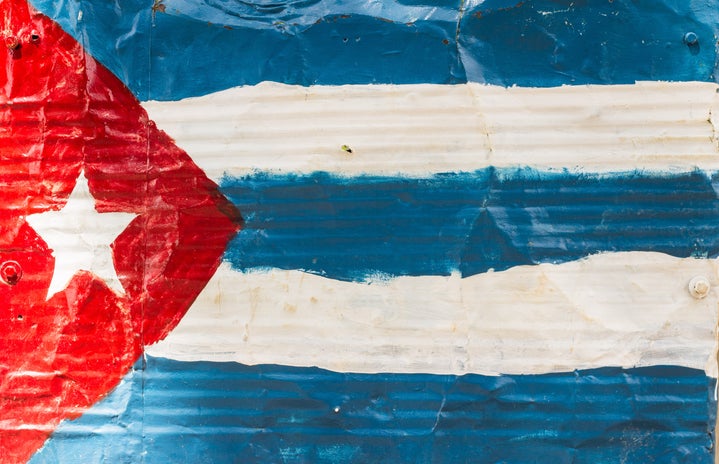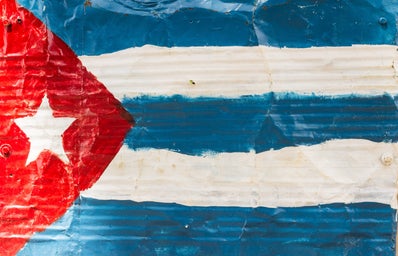From July 11 to July 17, 2021, the Cuban people took to the streets and marched across the 780-mile-long island to engage in the biggest protests the island had ever seen. But what influenced the Cuban people to participate in these mass demonstrations?
Ever since Fidel Castro came into power in 1959, followed by the enactment of the U.S. embargo on Cuba in 1962, the living standards in Cuba have been deplorable. Shortages of food and other supplies characterize daily life on the island, and the government heavily relies on censorship to maintain the illusion of a positive socialist society.
While protests over the lack of necessities and the government’s human rights violations have occurred in the past, they have never reached the scale of those that took place in the summer. After the country saw a spike in COVID-19 cases that caused its healthcare system to buckle under pressure, the government’s inability to protect its citizens became apparent. Thus, the Cuban people decided to take a stand.
As the Cuban citizens filled the air with shouts of “Patria y Vida” (“Homeland and Life,” which is a spin on the communist slogan, “Homeland or Death”), global conversations were sparked. These conversations became divisive as people struggled to find someone or something to point their fingers at: some blamed the socialist government for the hardships the Cuban people faced while others blamed the U.S. embargo on Cuba. In the blink of an eye, the movement was reduced to a political debate.
While disputes unfolded between Democrats and Republicans in the United States, young Cuban-Americans who felt undecided over their position in the debate observed from the sidelines.
Patricia Concepcion, a Cuban-American and fourth-year Chemical Engineering major, was born and raised in Cuba before emigrating to Florida. She provided a glimpse into her family’s struggles while living on the island.
“My family wasn’t at much liberty to talk about the injustices committed by the Cuban government, and that says a lot,” said Concepcion. “But later on, they shared a lot about how [they went] to the black market to get food for me and my sister, amongst other hardships.”
Concepcion disapproved of socialism when she was younger because it was easy to assume that this system was at fault for the difficulties her family had faced.
“But as I grew older and educated myself more, I realized there are many other factors at play,” Concepcion said. “I am no longer anti-socialist.”
Concepcion’s moderate political position is one that young Cuban-Americans are gradually adopting. This middle-ground attitude balances their understanding of their families’ experiences with the Cuban socialist society and their personal experiences with an American capitalist society.
Concepcion hoped that the protests in Cuba would lead to a revolutionary outcome.
“My parents and I were both in agreement with the protests in Cuba,” said Concepcion. “We had hope that Cuba would be free at last. [We’re] sad it didn’t work out like we wanted.”
Many Cuban-Americans have grown up hearing stories about how the socialist regime deprived their families of opportunities to the extent that Cuba itself became synonymous with oppression and poverty.
As Paola Ramos wrote for VOGUE, young Cuban-Americans living in Florida knew “the meaning of Castro, socialismo, and comunismo before [they] even learned how to add or subtract.”
As tensions continue to rise between the Democratic and Republican parties in the U.S., younger Cuban-Americans have become increasingly aware of politicians exploiting the traumas of their families and ancestors to gain support. A notorious example of this manipulation is the 2020 presidential election, in which Donald Trump secured the majority of the Cuban-American vote in Florida. Having emphasized a no-tolerance policy for socialist and communist policies, Trump’s goals deeply resonated with the older Cuban generation that suffered under Castro’s socialist regime.
“The overarching aim has been to equate Democrats with their long-feared enemy: socialism,” wrote Alexandra Martinez for CNN.
But some Cuban-Americans, like Martinez, would not fall for Trump’s manipulation, and she urged other Cuban-Americans not to, either.
“Our obligation as first-generation Cuban-Americans [is] to preserve the democracy our elders fought to bring us to; and the freedom so many still yearn for,” said Martinez.
This obligation requires us to remain wary of politicians with vested interests in our people. In a world where politicians exploit the fears of our vulnerable older family members, skepticism is the greatest weapon the younger generation possesses. When politicians show support for the end of the authoritarian regime or the U.S. economic sanctions, we should question whether their support is rooted in genuine concern for human rights or interest in advancing their political agenda. This simple distinction could save our families from facing their greatest nightmare: repetition of their past.
As Cuban-American rapper and singer, Pitbull, said in response to American politicians commenting on the protests in Cuba, “Politics are gonna be poli-tricks.” It is up to the younger generation of Cuban-Americans to decide if politicians are truly being authentic or if they are just “metiendo tremenda muela” (being evasive, untruthful, or overly complicated).


